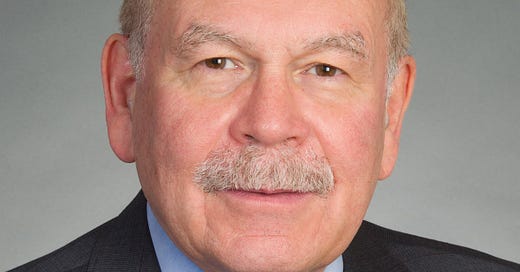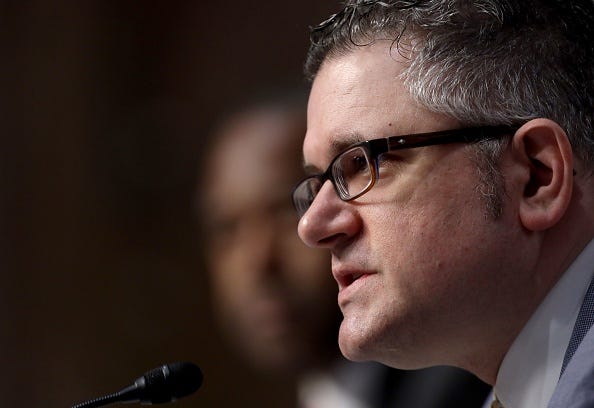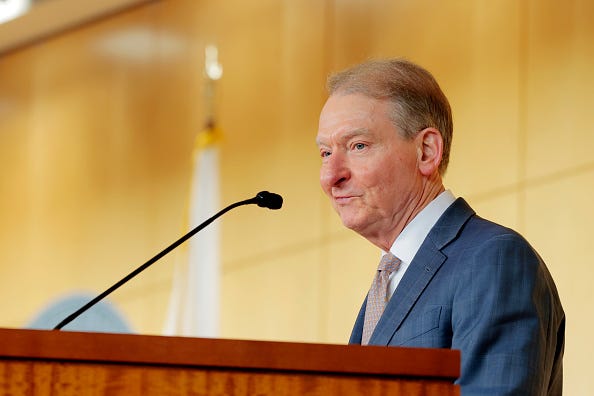Talking PCAOB; CFPB Chaos Hits Open Banking; Atkins Reassures SEC Employees
Capitol Account: Free Weekly Edition
How quickly things can change in Washington. Not long ago, crypto legislation was sailing through Congress. The CFPB’s leadership seemed set. And government agencies like the SEC were a pretty secure place to work.
All those premises are now wrong, as the news this week showed. The White House upended its nomination for the permanent CFPB director, instead tapping Jonathan McKernan for a top Treasury post. That only added to questions about who’s in charge at the consumer bureau, an issue we looked at this week in the context of its open-banking rule.
On Capitol Hill, Democrats grew louder in their opposition to GOP-led bills setting rules of the road for digital assets. They walked out of a House hearing on a new market structure draft, and then blocked a stablecoin measure from moving forward in the Senate. Both efforts are now in doubt. Scott Bessent also testified twice in the House – and though the Treasury secretary was initially rattled by attacks on his elite background, he eventually found his footing.
At the SEC, the new chairman sought to reassure nervous employees, but he didn’t deny that turbulent times may lie ahead. For our Friday interview, we talked with a former PCAOB board member about the latest attempt to abolish the auditing overseer.
Thanks for reading our digest of articles published this week. For much more coverage, click the button below to become a paid subscriber.
Friday Q and A: Conservatives have long wanted to abolish the PCAOB, but now Republicans on Capitol Hill are finally moving to get it done in the tax and spending bill winding through Congress. The effort has put the sleepy auditing overseer back in the limelight and unleashed a contentious battle over its future – one that might have a few more twists and turns ahead, given that SEC Chairman Paul Atkins has been one of the board’s most notable critics.
For those who pay close attention to the PCAOB, though, existential threats are nothing new. Birthed in the wake of the Enron fraud, the regulator stands out for its unusual structure as a non-profit corporation rather than a government agency. That setup drew a constitutional challenge more than fifteen years ago. The board survived, but the Supreme Court found that its leaders had to be removable at will by the president. The latest legislation, passed last month by the House Financial Services Committee, would be a death blow: it folds the organization into the SEC.
To discuss the stakes, we sat down this week with one of the PCAOB’s founding leaders. Now retired, Dan Goelzer spent nine years on the board, including as acting chairman. Suffice it to say, he’s strongly opposed to the efforts to kill it off. (Read his recent blog post, “Save the PCAOB!” here.) Goelzer, who served as an SEC general counsel earlier in his career, argues that the agency is ill-equipped to suddenly take over auditing oversight, a job that includes running an extensive inspections program and writing audit standards. And he points out that both investors and the accounting industry have benefited from the board’s work – there hasn’t been a major accounting flare-up since it opened its doors in 2003. What follows is our (lightly edited and condensed) conversation.
Capitol Account: How long were you at the PCAOB?
Dan Goelzer: I was part of the first group of board members who were appointed in October of 2002. We actually opened the doors in the first week of January in 2003. I left the board in the end of February 2012.
CA: Republicans are now looking to abolish the PCAOB. But when the Sarbanes-Oxley Act passed in 2002, creating an audit regulator didn’t seem to be a very partisan issue.
DG: It passed the House with three negative votes, and it passed the Senate 99 to nothing.
CA: The big driver of the law was a series of accounting scandals. What was going on at the time?
DG: There may not be many people that remember it very well now, but beginning in the late nineties there had been an uptick in restatements and a series of corporate reporting breakdowns. [Then SEC Chairman] Arthur Levitt had given a speech…about companies cooking the books. Then Enron collapsed, which then led to Arthur Andersen’s collapse. That was in the fall of 2001. In June of 2002, WorldCom collapsed.
CA: There’s nothing like a crisis to spur Washington to act.
DG: The market dropped precipitously at that point. Congress thought something had to be done on an emergency basis to restore confidence in financial reporting.
CA: Before Sarbanes-Oxley, how were accounting firms regulated?
DG: The [American Institute of Certified Public Accountants, a trade association,] had what they call a peer-review program…where one firm would come in and inspect another. That may have had some benefit, but it wasn’t independent. And the [AICPA’s] Auditing Standards Board…set the auditing standards. [That also] was the profession writing the rules for itself. People felt that those things should change.
CA: Why didn’t Congress just give these jobs to the SEC?
DG: It was considered…The thinking was that [auditing] was an important enough activity – and a technical enough activity – that it deserved to have its own regulator.
CA: Lawmakers set the PCAOB up as a non-profit corporation. Why?
DG: A big part of the reason was so that it wouldn’t be subject to the laws that apply to federal employment. For example, PCAOB salaries aren’t controlled by the government pay scale, which Congress thought was very important at the time – because of the need to be able to hire people with expertise in auditing. Those people obviously were earning private sector salaries.
CA: Speaking of pay, PCAOB board members make about $550,000 a year and the chair about $670,000. It hasn’t gone unnoticed that they earn more than the president.
DG: It’s been a flash point…In the first few years, we thought the logical thing to do is just set them at the same level as a [Financial Accounting Standards Board] member. But that only continued for a few years. As…SEC commissioners started complaining about board member salaries, they’ve been frozen – I think for the past 15 years or so. They are admittedly high by government standards, but they haven’t increased for a considerable period of time.
CA: You’ve come out strongly against the budget legislation passed recently by the House Financial Services Committee that would fold the PCAOB into the SEC. Why is this a bad idea in your view?
DG: I worked for a long time at the SEC. I love the SEC, but it has a tremendous number of things to do…It just can’t devote the same level of attention to audit quality that the PCAOB can….It seems to me, from the standpoint of both organizations and the profession, it’s a better setup.
CA: Opponents have pointed out that there’s no real cost savings in getting rid of the PCAOB. It’s funded by fees charged to public companies.
DG: I don’t see how it could do anything except cost the taxpayers money. This work would come on budget…(Friday)
Click here to subscribe and read the full interview.
Thanks for reading. Follow us on X @CapitolAccount and on LinkedIn by clicking here. We’re always looking for stories, so if you have any suggestions on what we should cover (or comments about Capitol Account), shoot us a note. Rob can be reached at: rschmidt@capitolaccountdc.com and Ryan at rtracy@capitolaccountdc.com. If somebody forwarded this to you and you’d like to subscribe, click on the button below. Please email for information on our special rates for government employees, academics and groups: subscriptions@capitolaccountdc.com.
CFPB Chaos: It seems the CFPB has been open for at least some business. But the question is, who’s in charge?
Over the course of the last two months, Mark Calabria, a top OMB official well-known to the financial industry, has been acting as the leader of the bureau’s regulatory work, sources say. His office has been a hub of meetings with banks and fintech companies, many of them looking to press their case about one hot topic: how to deal with the previous administration's open banking rule.
Unlike many of the policies enacted by Rohit Chopra, the effort on sharing data isn’t necessarily easy to just erase – and it has elements that both lenders and technology firms see as worth keeping. Both sides report that while the issue remains pretty adversarial, Calabria has been running a relatively orderly process, making him a port in the broader storm surrounding the agency’s future.
On April 17, however, the playing field suddenly shifted – and not even Calabria himself appears to have been prepared for the fallout. One major casualty may well be the open banking rule itself.
That Wednesday afternoon, layoff notices went out to nearly 90 percent of the bureau, including the vast majority of the regulation-focused team Calabria was (reportedly) leading. On a call with CFPB staff soon after, Calabria appeared not to have known in advance about the mass firings. Instead, he was trying to figure out how work on the open banking plan and other rules would move forward, one source says. That, of course, was extremely difficult. The ousted employees were set to have their access cut off within 24 hours – until a federal judge put the firings on hold.
In the wake of the chaos, Calabria’s tone on the open banking rule has changed, sources say. Instead of discussing how to rework the regulation, which was started under former Republican director Kathy Kraninger, he has indicated the administration will need to vacate it entirely. “Start over” is how Calabria put it to one person over the weekend, according to a source briefed on the conversation.
The reversal has set off a scramble among the rule’s most ardent defenders…(Monday)
Click here to subscribe and read the full article.
Reassurance: Atkins hasn’t spoken much publicly at this early point in his tenure, so it was notable when he released an address he gave at an internal town hall earlier this week. The remarks shed a little light on his policy priorities, but they primarily seemed aimed at reassuring jittery SEC employees. Atkins told the assembled staff that he’s working on a “targeted, common-sense reorganization” of the agency, conceding there may be some turbulence ahead. And the new chairman took pains to underscore that the turnaround won’t blow the place up.
“I cannot say that the current times are not without uncertainty,” Atkins acknowledged at the meeting. “Many of you have expressed your uncertainty to me.”
Noting that he’s only in his third week on the job, Atkins didn’t provide a lot of details about the restructuring. But he indicated that the workforce will be smaller as the commission works “on optimizing our efficiency.” That includes a new project to “review our technology infrastructure and our contractual obligations,” an effort he emphasized is “long overdue.”
The chairman also finally put some concrete numbers on employee departures in the wake of the Trump administration’s early retirement and buyout offers – figures that until now have been kept under wraps. Headcount is down 15 percent since the 2025 fiscal year started, leaving the SEC with about 4,200 full-time workers and 1,700 contractors. Still, Atkins said that the exits “leave vacancies that in many cases need to be filled.”
Addressing the agency’s decision to give up the leases on outposts in Los Angeles and Philadelphia – a move that has sparked worries about mass layoffs – Atkins said he “shares” concerns that have been raised about the issue and is working to resolve it. “Let me say unequivocally that I firmly believe in our regional office concept,” he stressed. “We cannot and should not have everyone in Washington and New York.” (Interestingly, the topic led him to take a swipe at one of his predecessors, Mary Schapiro, who ceded the agency’s leasing authority to the General Services Administration after a scandal over an aborted move of the SEC’s headquarters. “That action puts me in a weaker position today,” he said.)
For those trying to read the tea leaves on the fate of Commissioner Caroline Crenshaw given Trump’s penchant for firing Democratic regulators, Atkins had some intriguing news. He was “happy to say” she has agreed to work on an assessment of the regulator’s “administrative law framework and procedure” in light of the Supreme Court’s recent decisions reining in the agency’s authority. The rulings “oblige us to rethink and reform this area” Atkins said. “It is high time we take this task to heart.”
As for the Republican commissioners, Mark Uyeda is going to take the lead on the international front and Hester Peirce will continue to lead the crypto task force.
On policy, Atkins reiterated that setting rules for digital assets is a top priority. He also foreshadowed an overhaul…(Thursday)
Click here to subscribe and read the rest of the article.





